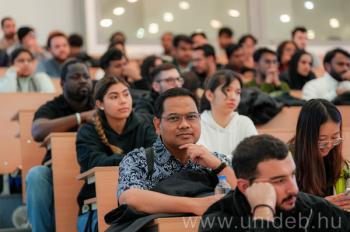
Key Components of an Effective Orientation for International Students
Orientation is the launchpad that connects a newly enrolled foreign student with the academic environment, campus culture, and the practical day‑to‑day life in Hungary. The Faculty of Economics and Business at the University of Debrecen demonstrates how a well‑structured program can reduce cultural shock and set students up for success.
Academic Introduction: What to Expect in the Curriculum
Kick‑off presentations usually cover the range of available degree pathways—bachelor’s, master’s, and doctoral—along with core modules, elective options, and the pedagogical style of faculty members. Having a clear academic map helps international students identify course requirements early, especially when language of instruction is English but local regulations and assessment methods are rooted in Hungarian higher‑education standards.
Cultural Integration: Navigating Everyday Life in Hungary
Everyday norms such as punctuality, respectful address of professors (use formal titles and surnames, *úgy hívni a tanárt először *), and email etiquette differ markedly from South American or Asian practices. The Faculty’s orientation schedule often includes short workshops that highlight:
- Punctuality and time management: Hungarian students value precise timing, more so than in many Southern cultures.
- Formal email structure: Clear subject lines, polite greetings, concise requests, and appropriate sign-offs.
- Respectful classroom behavior: Silence during lectures, limited phone use, and active participation during seminars.
These guidelines prepare students to integrate into both academic teams and the local community with ease.
Networking Opportunities: Building a Support System
Informal gatherings—quiz shows, after‑party socials, and student council mixers—enable language practice and cultural exchange. The Faculty of Economics invites both domestic and international students, with the latter gaining exposure to native Hungarian speakers who have already navigated the dual‑language environment. The presence of a growing cohort of Hungarian‑speaking international students—currently 34—acts as a living bridge for newcomers.
Practical Tips for International Students Before Arrival
Proactive preparation can streamline the transition process. Here are actionable points advisors recommend:
- Confirm Accommodation: Secure long‑term housing at or near the Böszörményi út campus, where the orientation session usually takes place. The Student Council often offers shared‑room options or links to vetted landlords.
- Health Insurance & Registration: Register with the local municipal office (the *Központi Jegyzetelő*) and obtain a health insurance card before the semester starts.
- Bank Account & Mobile Phone: Open a local banking account (e.g., OTP, K&H) and obtain a Hungarian SIM card to receive academic SMS alerts and local calls.
- Document Translation: If you plan to study offers prepared in Hungarian, translate necessary documents, such as past transcripts and language certificates, into Hungarian and have them notarized.
These steps minimize administrative delays and allow students to focus on orientation workshops and networking.
Maximising the Orientation Experience: What to Focus On
During orientation, prioritize sessions that address real‑world challenges:
| Session | Key Takeaway |
|---|---|
| Faculty Overview | Understand degree structure and support services. |
| Language & Culture Workshop | Learn Hungarian greetings, public‑transport tap‑ins, and cafeteria etiquette. |
| Academic Standards Talk | Discover grading criteria, plagiarism policy, and office‑hour usage. |
| Student Council Hub | Meet peers, learn about clubs, and schedule informal meet‑ups. |
Participants should actively ask questions, take notes, and follow up on contact details posted on the campus distribution board or shared email lists.
How the Faculty Supports Long‑Term Success
The Faculty of Economics’ dedicated International Affairs team monitors the cultural assimilation of each student. Beyond orientation, they provide:
- Mentorship Pairings: Partner international students with Hungarian peers experienced in navigating academic life.
- Language Labs: Offer daily Hungarian conversation sessions that complement the English‑centric coursework.
- Career Preparation: Host workshops on CV writing for EU employers, internship portals, and networking events with local companies.
These resources foster a sense of belonging and help students build professional networks that will serve them in Hungary and abroad.
Next Steps: From Orientation to Enrollment
After a productive orientation, students should verify the following:
- Complete the campus registration online.
- Set up a student email account and subscribe to the faculty’s mailing list.
- Finalize course selections via the enrollment portal by the deadline.
- Schedule an introductory meeting with the International Office to discuss housing, banking, and health insurance.
These actions establish a solid foundation before the semester begins.
Explore the Orientation Overview
Apply for the Faculty of Economics now
Read our FAQ
Share Your Experience
If you are an international student who has gone through the orientation or a newcomer eager to provide insights, leave a comment below. Your feedback helps others prepare and improves future orientation programs.
We hope this guide equips you with an overview of the orientation process at the Faculty of Economics, University of Debrecen, and inspires you to embark on a well‑structured academic journey in Hungary.

